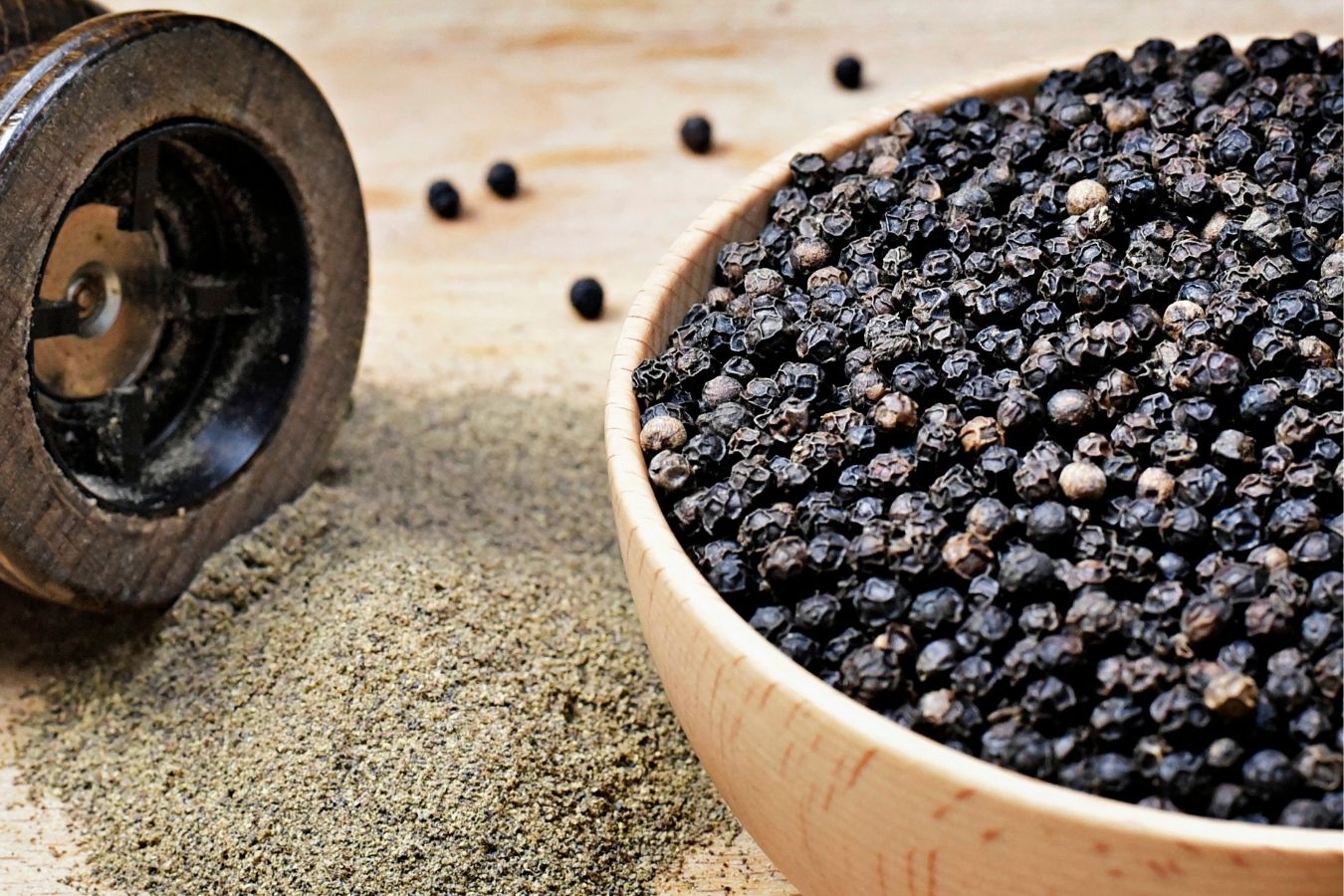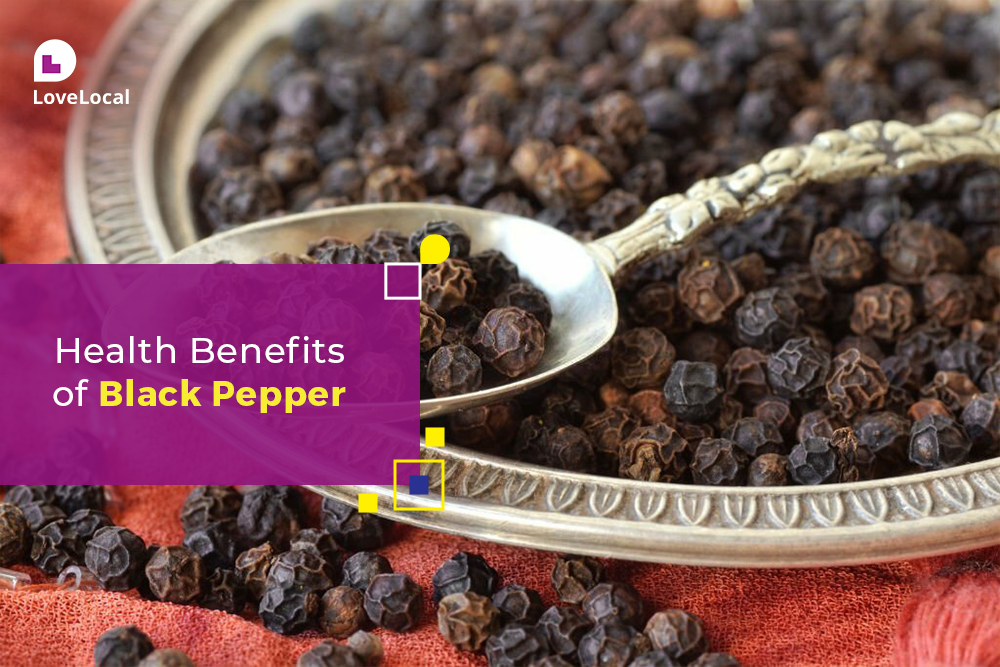Introduction
Black pepper, often referred as the “king of spices,” has been a prized culinary and medicinal ingredient for centuries. This humble spice, native to South India but now cultivated worldwide, is known for its robust flavor and aroma. Yet, beyond its culinary uses, black pepper also boasts an array of health benefits that have been celebrated in traditional medicine and are now being validated by modern scientific research.

1. Rich in Nutrients
Black pepper is a nutritional powerhouse. It contains essential vitamins and minerals, including vitamin C, vitamin K, and various B vitamins. These nutrients play critical roles in maintaining complete health, supporting the immune system, and helping bone health.
2. Aids Digestion
One of the most well-known benefits of black pepper is its role in promoting digestion. It stimulates the taste buds, which, in turn, signal the stomach to produce hydrochloric acid. This acid is crucial for breaking down food in the stomach, ensuring proper nutrient absorption. Additionally, black pepper can reduce bloating and gas by helping to eliminate excess gas from the digestive tract.
3. Enhances Nutrient Absorption
Black pepper contains piperine, a compound that enhances the absorption of various nutrients from the digestive tract. Piperine has been shown to increase the bioavailability of a wide range of vitamins and minerals, including vitamin A, vitamin C, selenium, and beta-carotene. This is especially important for individuals seeking to maximize the nutritional benefits of their diets.
4. Anti-Inflammatory Properties
The root cause of many chronic diseases, such as arthritis and heart disease, is inflammation. Black pepper’s piperine has demonstrated anti-inflammatory properties, which can help reduce inflammation in the body. This may lead to relief from conditions like arthritis and may also contribute to overall well-being.
5. Antioxidant Action
Black pepper is rich in antioxidants, which help protect the body from the harmful effects of free radicals. Free radicals can cause oxidative stress, which may contribute to various chronic diseases and accelerate the aging process. The antioxidants in black pepper can neutralize free radicals, reducing the risk of these negative health outcomes.
6. Weight Management
Piperine, found in black pepper, has also been associated with weight management. Research suggests that it may help reduce fat accumulation in the body by interfering with the genes responsible for fat storage. It can also increase the body’s metabolic rate, which can aid in weight loss and management.
7. Cognitive Health
Some studies suggest that piperine may have potential benefits for cognitive health. It may help protect against neurodegenerative diseases like Alzheimer’s by reducing oxidative stress and inflammation in the brain.
8. Antibacterial and Antifungal Properties
Black pepper has been used traditionally to treat various infections. Studies have indicated that it possesses antibacterial and antifungal properties, making it a potential natural remedy for common ailments.
Black pepper with hot water benefits
· Improved Digestion
· Respiratory Health
· Detoxification
· Anti-Inflammatory Properties
· Antioxidant Effects
· Pain Relief
Benefits of turmeric and black pepper
When black pepper is consumed with turmeric, the piperine(alkaloid present in black pepper) in black pepper enhances the absorption of curcumin (the main active ingredient in turmeric) in turmeric by up to 2000%. This means you can experience the full range of health benefits from turmeric more effectively.

Benefits of black pepper and honey
· Sore Throat Relief
· Cough Suppressant
· Immune System Support

Benefits of black pepper for skin
While black pepper is primarily used as a spice or seasoning in cooking, it can also offer some potential benefits for the skin when consumed internally.
Antioxidant Protection:
Black pepper contains antioxidants, such as piperine and others, that can help neutralize free radicals and reduce oxidative stress in the body. This can contribute to healthier skin by preventing damage caused by environmental factors and aging.
Anti-Inflammatory Effects:
Piperine in black pepper has demonstrated anti-inflammatory properties. Reducing inflammation in the body may help alleviate skin conditions associated with inflammation, such as acne, redness, and irritation.
Detoxification:
Eating Black pepper may support detoxification processes, which can indirectly benefit the skin by reducing the burden of harmful substances on the body.
Conclusion
Black pepper, often regarded as a simple kitchen staple, has been shown to offer a multitude of health benefits. Its ability to aid digestion, enhance nutrient absorption, reduce inflammation, and provide antioxidant protection makes it a valuable addition to a healthy diet. Whether used as a seasoning or as part of a traditional remedy, black pepper is indeed a spice that adds flavor not only to your dishes but also to your well-being. Purchase black pepper through the “lovelocal” platform.



